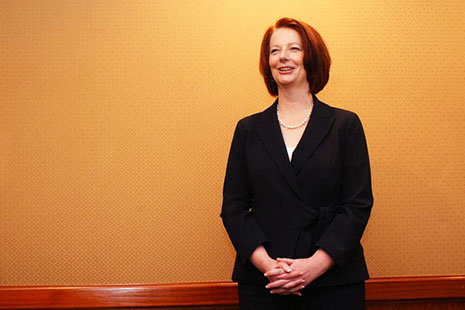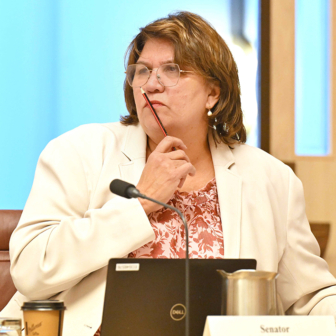TWO YEARS out from the next scheduled federal election and Labor’s primary vote is in free fall, occupying the opinion poll equivalent of the undiscovered country from whose bourn no traveller returns. Can Labor’s stocks be revived, or has the prospect of impending doom so permeated the government that its fate is all but sealed, as was the case in New South Wales earlier this year?
A sober and realistic answer would have to be against resurrection, but a lot can happen in two years. Julia Gillard is not Kristina Keneally and nor is her government the self-sabotaging rabble that occupied the Treasury benches in Macquarie Street until voters had their emphatic say in March. Richard Nixon and John Howard demonstrably defied the odds with spectacular comebacks built on a combination of fortuitous circumstance and thoughtful makeover.
As Gillard said recently, democracy is more than a succession of opinion polls – but she is as keenly aware as anyone that the poll trend, abysmal for Labor whichever way one looks at it, needs to be reversed. Mission impossible it might be; but while the government and Gillard are clearly down, the count has a long way to run.
It is worth looking at the factors that are hurting the government, because identifying and diagnosing the ailments may well go some way towards suggesting a road to recovery, however fanciful that might be.
First, foremost and most formidable is the Abbott factor. The government – and the prime minister in particular – needs a strategy to counter the opposition leader’s dominance of retail politics. Relentless and tireless, Tony Abbott is the ubiquitous marathon man. In a sense he enjoys an unfair advantage over the prime minister: she has a country to run, he has merely a campaign. While he diverts her focus to the latter, he succeeds in setting the agenda, allowing tactic to take precedence over strategy.
Some years ago at the height of the Howard government’s ascendancy, a senior Liberal Party strategist was asked at an industry briefing for his views on why Labor kept losing election after election. His reply, as terse as it was cynical, was simply this: “No mystery. Fear trumps hope every time.”
Abbott, like Howard, reads and exploits the public mind well. He has played on fear of rising prices and job losses by skilfully reframing the issue of climate change not as an urgent ecological remedy but as a tax, a ploy that is as blatantly populist as it is disingenuous. The real effects of climate change are beyond dispute, and if anyone wants a sharp reminder of what awaits us, then look no further than the independent Climate Commission’s recent report, The Critical Decade. Abbott, who is on record as saying that climate change is “crap,” has managed to shift the focus from hope to fear, and Gillard has unwittingly abetted with her frequent affirmation of her “belief” in climate change, which, given the weight of evidence, is about as helpful as saying one believes in gravity.
Do Gillard and her government have the requisite political skills to counter Abbott’s campaign juggernaut? Given the way in which the mining tax and the carbon tax have been handled, one hesitates to answer in the affirmative. But if the government’s pulse is to be restored above flatline level, then this has to be the primary objective.
For all Abbott’s apparent dominance, he is vulnerable both in the electorate and among his own followers. He has made no secret of the fact that he will do whatever he can to bring about an early election, and one has to ask why. Is it merely impatience to move into the Lodge, or are there other factors at work?
Windows of opportunity do not stay open forever. Abbott is keenly conscious of the fact that public opinion can be volatile, and should the government manage to turn the tables and put him in the spotlight, things could change. Abbott is exposed on the policy front, especially when it comes to climate change and the old perennial of industrial relations.
How, for example, would he dismantle the carbon tax? And that in itself poses another imponderable – and one that Abbott will not address: how does he propose to deal with the Greens? That is a vital question because they are part of the political equation now and for the foreseeable future. They cannot be wished out of existence by demonising them as extremists. What would an Abbott government in the House of Representatives have to do to get any legislation at all through the Senate?
The spectre of an Abbott government – what it would look like, what it would do and, just as importantly, what it would not do – needs to be raised by Gillard, and she will. Two can play the fear game, but that might be a little further down the track.
Should Abbott come under sustained scrutiny, this will open up a second front of vulnerability – his own party. The Liberals have a very instrumental view of leadership: it’s about delivering the goods, and that is why John Howard was never in any danger from a Peter Costello challenge.
As long as Abbott has his party on track for government he is safe, but any sign of faltering and that could change. It is no secret that there are many in his party who have deep misgivings about him, mostly in regard to political style. He can, and does, say silly things at times, and a close reading of the polls suggests there is deep ambivalence towards him. It also needs to be remembered how he won the leadership – that is, by a single vote after three people in the party room who had voted to put Malcolm Turnbull’s leadership to the test promptly returned to Turnbull after Joe Hockey was eliminated and the only challenger was Abbott.
Julia Gillard might yet be the tortoise to Tony Abbott’s hare. Not improbable, not impossible, but still highly unlikely. •
Norman Abjorensen teaches public policy in the Crawford School of Economics and Government at ANU. He is co-author of Australia: The State of Democracy.




